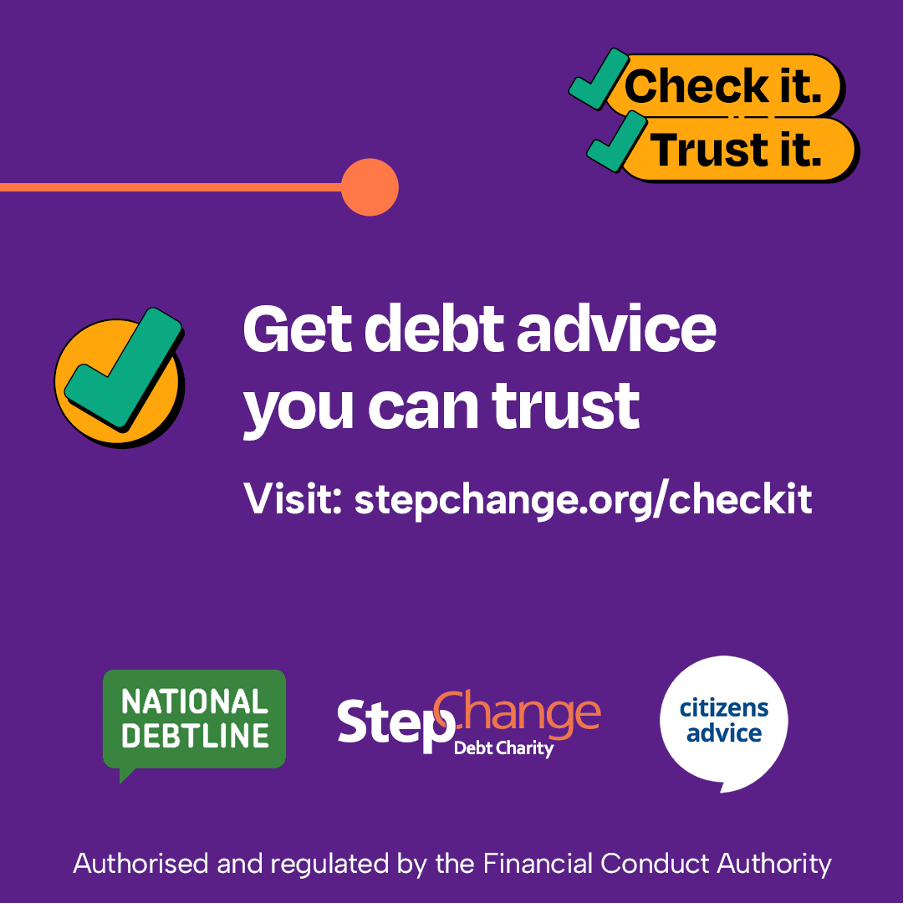Your read progress
Debt scams, misleading ads & how to protect yourself
4 minute read
Updated 17th September 2025 | Published 27th July 2023

A scam is any kind of fraudulent scheme used to get money or anything else of value. Whether it is through a fake email, text or a phone call, the consequences of scams can be long-lasting. Charmaine Musonza from StepChange shares the debt charity’s advice on how to protect yourself from scams and misleading ads.
Unfortunately, scam and misleading ads are rife across social media platforms like Facebook and Instagram, and impersonator adverts are regularly spotted in Google’s sponsored ad results, appearing above legitimate sites in a bid to access those in search of free charity assistance. For example, when seeking free debt support, you may think that it’s enough to type the name of the organisation you’re searching for and click the first result that shows up, but that sadly isn’t the case.
Clone firms can pose as StepChange and other reputable debt advice providers, like National Debtline and Citizens Advice. In 2023, StepChange reported close to 40 such instances of trademark infringement – ads using their name in advertising copy or linking out to websites with similar names, but no affiliation with the charity.
Check it, trust it
A quick online search will find many misleading ads aimed at single parents or adults in vulnerable situations. Claims of too good to be true solutions to debt concerns, and plenty of 'government-backed schemes to write off your debt'.
There are some companies that only push one way to deal with debt. They sell debt solutions like IVAs (Individual Voluntary Arrangements) and Trust Deeds because they can make significantly more money from them, but those solutions might not necessarily be right for you.
It’s incredibly important to be aware of all possible solutions available to you, as well as understanding the risks associated with each of them. A reputable organisation will take the time to evaluate all viable options, they will explain the positives and negatives of each in an impartial manner and allow you to consider the most appropriate route forward for your financial future.
In addition, some lead generators may pretend they are acting in your best interests, but they could be selling client details to third parties for a profit – if your financial health is not their focus, then it could be the solution provided may not bring you true relief from your money concerns.
Ultimately, if the deal sounds too good to be true, then it probably is!
To make sure you are getting debt advice you can trust, take these steps:
- Check they are approved – Search online for the ‘FCA register’ and check they are on it. If they are, read the small print. Some companies are on the register, but when you read the ‘what can this firm do in the UK’ section, they have ‘limits’ on giving ‘debt counselling’. Remember, local councils are not on the register, but they also provide trustworthy advice.
- Check the language – Saying things that are too good to be true, like ‘Government-backed easy and quick debt write-off’ could be a red flag. Additionally, good debt advice doesn’t just push one way to deal with debt. It gives you choices.
- Check it is honest – Some companies pretend to be well-known debt advice providers, such as StepChange. Check their web address, if it is not as expected (e.g., www.stepchange.org) then it isn’t legitimate. Look out for contact details, too. Are there any clearly listed on the website? It can be a red flag if they offer no way for you to contact them, but they are able to reach you as they please.
- Check your details are safe – Some companies take personal details like your first name, last name, and date of birth to sell them. Ask the company what details they want, who they are sharing it with, and how they are keeping your details safe. You can also ask for their ‘privacy notice’ which offers information about how they will use your details.
Staying safe & accessing genuine support
Could you benefit from a supportive conversation about money management or budgeting? Perhaps you are ready to begin the process of getting expert advice on your financial situation? If so, then consider contacting an organisation like StepChange.
Please note, a legitimate debt organisation is unlikely to contact you without letting you know. If a company calls or emails you out of the blue and claims to be someone like StepChange when you have not already spoken to them, then this is likely to be a scam. Organisations like Stepchange will never appear on your phone as 'StepChange' when they call, and they do not message clients through apps like WhatsApp.

Written by Errolyn
Senior Content and Social Media Executive
As Featured By
Join our mission
We use the power of consumer reviews to help increase trust and transparency in financial services and to deliver industry leading insight and events.
Write a reviewExplore our other topics

News: Awards

News: Industry news

News: Smart Money People news

Guides: Smart money guides

Guides: Smart money tips


.png)


